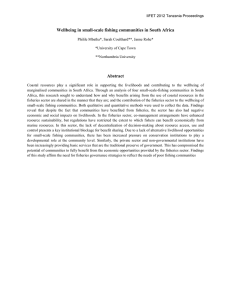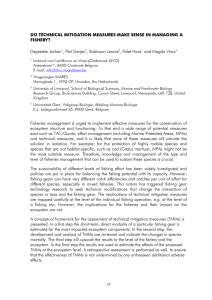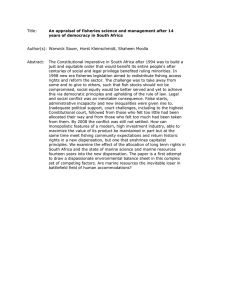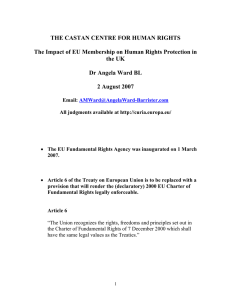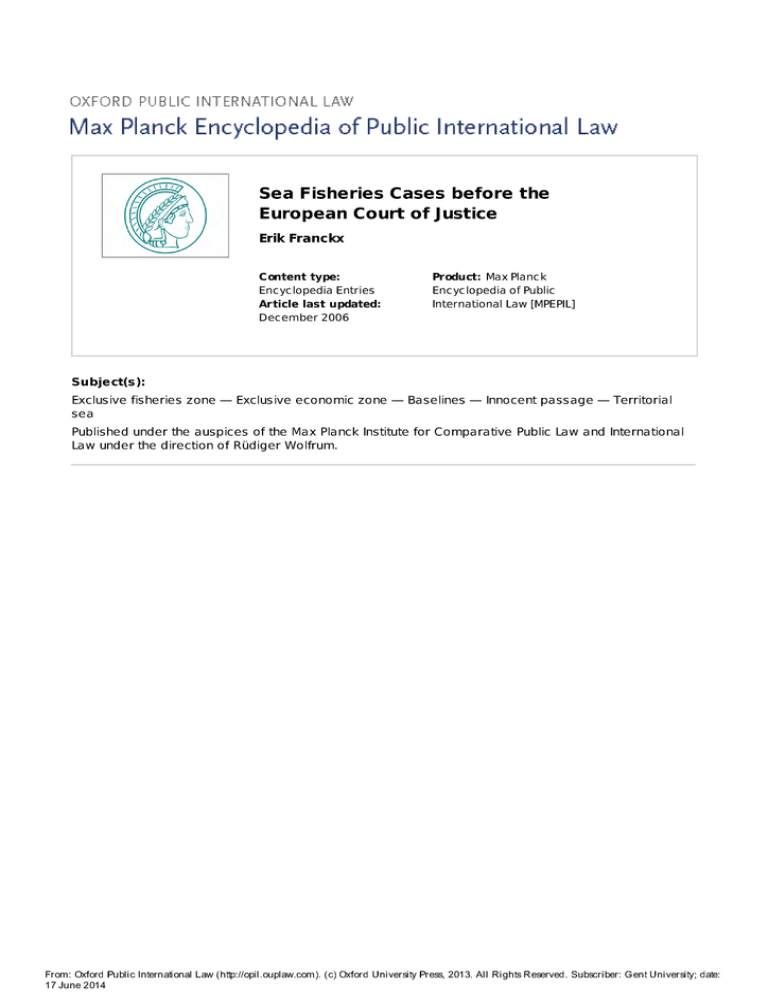
OXFORD PUBLIC (INTERNATIONAL LAW
Max Planck Encyclopedia o f Public International Law
Sea Fisheries Cases b efo re the
European Court o f Justice
Erik Franckx
Content type:
Product: Max Planck
E ncyclo p e d ia E ntries
E ncyclo p e d ia o f Public
In te rn a tio n a l Law [MPEPIL]
A rticle last updated:
D e c e m b e r 2006
Subject(s):
Exclusive fisheries zone — Exclusive economic zone — Baselines — Innocent passage — Territorial
sea
Published under the auspices of the Max Planck Institute for Comparative Public Law and International
Law under the direction of Rudiger Wolfrum.
From: Oxford Public International Law ( http://opil.ouplaw.com). (c) Oxford University Press, 2013. A ll Rights Reserved. Subscriber: G ent University; date:
17 June 2014
A. Introduction
1 Approxim ately 300 sea fisheries cases have been dealt with by the judicial institutions of the
European Community (European (Economic) Community; European Communities, Court of Justice
[ECJ] and Court of First Instance [CFI]). Their nature evolved in line with the changes ratione loci
and m ateriae of the European Common Fisheries Policy ('CFP') and can be grouped around seven
main issues. The first three issues deal with jurisdictional matters: Before the establishment of 200mile zones, thereafter, and relating to the specific regime of coastal waters (Fisheries, Coastal).
Two fundamental concepts underlying the European internal fisheries regime—the principles of
equal access and relative stability—are dealt with next. The form er means that, as a rule, Member
States have equal access to each other's maritime waters. The latter underlies the allocation of
fisheries resources between the Member States. The ensuing practice of so-called quota-hopping
is dealt with next. A final issue concerns the integration of environmental aspects into the CFP. In
many of these cases and when confronted, inter alia, with lacunae in Community fisheries law,
international law has been relied upon (European Community and Union Law and International
Law).
B. Jurisdictional M a tte rs
2 EC legislation does not use the custom ary international law term inology for describing and
defining Member States' maritime zones, but refers to the waters under sovereignty and
jurisdiction of the Member States. These are not defined by EC legislation, but the form er would
seem to refer to the Member States' territorial seas, whereas the latter comprises the Member
States' exclusive economic zones or fishery zones (Exclusive Economic Zone; Fishery Zones and
Limits). The jurisdictional com petence of the EC has been challenged both with regard to the high
seas (Fisheries, High Seas) and the waters under jurisdiction of the Member States. The main
reason was that certain Member States wanted to preclude large offshore waters from the
application of the EC's access and conservation regime. In the Joined Cases 3/76, 4/76 and 6/76
Cornelis Kramer and others the ECJ held, after establishing the internal com petence by reference to
the European Economic Community ('EEC') Treaty and the 1972 Act of Accession, that it follows
'from the very nature of things that the rule-making authority of the Community ratione materiale
also extends— in so far as the Member States have sim ilar authority under public international law
—to fishing on the high seas' (at para. 30/33 ; see also International Organizations or Institutions,
Implied Powers).
C. Principle o f Equal Access
3 Shortly after the concerted establishment of 200 nautical mile fishery zones in 1977, the ECJ
pointed out that '[a]s institutional acts adopted on the basis of the Treaty, regulations apply in
principle to the same geographical area as the Treaty itself and 'any extension of the maritime
zones automatically means the same extension of the area to which the regulation applies' (Case
61/77 Commission v Ireland paras 46, 50; Treaties, Territorial Application). The m ost important
result of this judgm ent is the finding that EC fishermen have the right of equal access to the fishing
grounds of all Member States, a right which flows from the strict application of the non­
discrimination principle. In an analogous case, the United Kingdom ('UK') claimed th a tth e Member
States had an inherent power of regulating fishing in waters within their own jurisdiction, the extent
of which at any given time depends on the rules of international law. Such interpretation limits EC
fisheries measures to the Member States' coastal waters, extending m axim um up to 12 nautical
miles as measured from the baselines. The ECJ deduced from the relevant EC provisions and the
above case-law that such com petence was vested in the EC institutions (Case 32/79 Commission
o f the European Communities v United Kingdom o f Great-Britain and Northern Ireland).
4 An important derogation to the principle of equal access is found in the authorization for
Member States to restrict fishing in their coastal waters to fishing vessels that traditionally fish in
those waters from ports on the adjacent coast (Fishing Boats). In doing so, the traditional fishing
activities of other Member States need to be respected. The extension of this derogatory regime
From: Oxford Public International Law ( http://opil.ouplaw.com). (c) Oxford University Press, 2013. A ll Rights Reserved. Subscriber: G ent University; date:
17 June 2014
until the end of 2012 has led to the view that the arrangements with respect to this zone take the
form of a general non-disc rim inatory rule with objectively justified exceptions. Consequently, the
principle of equal access would seem to apply in principle to the Member States' adjacent waters
(Case C-91/03 Kingdom o f Spain v Council o f the European Union [Opinion Advocate General
Tizzano]). Indirectly, the extent of the Member States' coastal waters stood central in Case C146/89 Commission o f the European Communities v United Kingdom o f Great-Britain and
Northern Ireland. The UK availed itself of its com petences under international law to justify the use
of am bulatory baselines, those defined from time to time by the Member States. Following the
extension of its territorial sea from three to 12 miles in 1987, certain low-tide elevations would also
constitute base-points for the drawing of the baselines from which the six and 12 mile fishery
zones and limits would be determined. As a result, fishermen from other Member States would be
excluded from the zones in which they had hitherto fished and non-habitual fishermen were to be
excluded from areas where they were previously entitled to fish. The ECJ endorsed the view that
the zones located in the UK's coastal waters between the six- and 12-mile limit were to be
measured from the baselines as they existed on 25January 1983, the date on which Council
Regulation (EEC) 170/83 of 25 January 1983 establishing a Community system for the conservation
and m anagem ent of fishery resources ([1983] OJ L 24,1) ('Council Regulation 170/83') defining the
fishing rights of other Member States in these zones, was adopted. The ECJ observed that
'[¡International law merely authorizes States to extend their territorial sea to 12 nautical miles and,
in certain circum stances, to draw the baselines used to measure the breadth of the territorial sea
to and from low-tide elevations which are situated within that territorial sea' (Case C-146/89
Commission of the European Communities v United Kingdom of Great-Britain and Northern Ireland
para. 25). Since the decision to make use of the options under the rules of international law was
attributable solely to the UK, the latter had unilaterally altered the scope of the provisions in the
regulation concerned (see also Unilateral Acts of States in International Law). This judgm ent
touches on the delicate issue of national sovereignty and shows that Member States cannot invoke
com petences, which they have under international law, in order unilaterally to modify obligations
incum bent upon them under EC law.
D. Principle o f R elative Stability
5 The accession of Spain to the EEC constituted an im portant vehicle for change to the CFP. The
prospect of the Spanish fishing armada invading the European waters greatly facilitated the
adoption of an EC conservation policy in 1983. The main features of this policy are the yearly
adoption of total allowable catches and the distribution of quotas among the Member States in
conform ity with the principle of relative stability. This allocation key was devised to appease the
annual negotiations on quota allocations. It soon proved an instrument to conserve the EC status
quo. In particular, Spain and Portugal challenged this concept, or rather their exclusion from it. The
ECJ consequently specified its aim, function and scope. In Case 216/87 The Queen v M inistry o f
Agriculture, Fisheries and Food, ex parte Jaderow Ltd, the aim of the system of national quotas
was considered to 'assure each Member State relative stability of fishing activities for each of the
stocks considered' (at para. 22). In conform ity with the recitals of Council Regulation 170/83,
relative stability was to be understood in the sense 'that stability ... m ust safeguard the particular
needs of regions where local populations are especially dependent on fisheries and related
industries' (ibid). It follows that the aim of the quota system is 'to assure each Member State a
share of the Comm unity's total allowable catch, determined essentially on the basis of the catches
from which traditional fishing activities, the local populations dependent on fisheries and related
industries of that m em ber State benefited before the quota system was established' (ibid para. 23).
Addressing the function of the notion of relative stability—establishing an equitable distribution of
resources (see also Equitable Utilization of Shared Resources)—the ECJ noted that 'in order to
make a fair allocation of available resources, particular account must be taken of traditional fishing
activities, the specific means of areas particular dependent on fishing and its dependent industries
and the loss of fishing potential in the waters of third countries' (ibid para. 22). It is for the Council,
when allocating fishing opportunities among the Member States, 'to reconcile, for each of the
stocks concerned, the interests represented by each Member State with particular regard to its
traditional fishing activities and, where relevant, its local populations and industries dependent on
From: Oxford Public International Law ( http://opil.ouplaw.com). (c) Oxford University Press, 2013. A ll Rights Reserved. Subscriber: G ent University; date:
17 June 2014
fishing' (Case C-4/96 Northern Ireland Fish Producer’s Organisation Ltd (NIFPO) and Northern
Ireland Fishermen's Federation v Departm ent o f Agriculture for Northern Ireland para. 48). As far
as the scope of the notion of relative stability is concerned, the ECJ in Case 46/86 A lb e rt Romkes v
Officier van Justitie for the D istrict o f Zw olle specified that 'the requirement of relative stability
m ust be understood as meaning that in that distribution each Member State is to retain a fixed
percentage' and that this allocation key 'is to continue to apply until an amending Regulation is
adopted in accordance with the procedure followed for Regulation No 170/83' (at para. 17). To date
no such action has been taken. This solution is also applicable to the new Member States, including
the allocation of external resources, in so far as their act of accession did not modify the existing
EC rules (Joined Cases C-63/90 and C-67/90 Portuguese Republic and Kingdom o f Spain v Council
o f the European Communities para. 44). For the purposes of assuring the principle of relative
stability, the latter 'm ust be assured, for each Member State, for each of the stocks considered, that
is to say for fish of a particular species located within a specified geographical area' (ibid para. 28;
Fish Stocks). From Case C-179/95 Kingdom o f Spain v Council o f the European Union, it seems to
follow that the quotas need to be uptaken in the specified geographical area. Finally, following
applications from individual Spanish fishermen and fishery organizations after the Estai incident,
the ECJ pointed out that 'the principle of relative stability concerns only relations between Member
States, it cannot confer individual rights upon private parties' as it cannot be applied to a bilateral
fisheries agreem ent concluded by the EC either, since the latter is concluded on the basis of
international law 'to which the principle in question is unknown' (Case T-196/99 Area Cova SA and
others v Council o f the European Union and Commission o f the European Communities paras 152,
151; see also Individuals in International Law). The allocation of quotas in case of bi- or multilateral
fisheries agreements, on the other hand, remains the sole com petence of the EC (Case C-120/99
Italian Republic v Council o f the European Union para. 63). The ECJ has stressed that the quota
system, and by implication the principle of relative stability, constitutes a derogation from the
general rule of equal conditions of access to fishery resources (Case C-216/87 The Queen v
M inistry o f Agriculture, Fisheries and Food, ex parte Jaderow Ltd para. 24). Nonetheless, the
principle of equal access seems de facto to have been replaced by the principle of relative
stability. The derogations to the equal access principle in the coastal regime have been renewed
following each major review of the CFP. In contrast, no explicit temporal limit has been placed on
the quota regime. The necessity of ensuring relative stability is found in the precarious economic
state of the fishing industry and the dependence of certain coastal com munities on fishing.
Additionally, the tem porary biological situation of stocks is invoked (recitals 16 and 17 on the
conservation and sustainable exploitation of fisheries resources under the Common Fisheries
Policy [2002] OJ L 358/59). Because of these justifications, reference to the equal access principle
merely seems to serve as a tool to keep the EC concept alive. This dual situation is exem plary for
the indistinctness of the CFP regime.
E. Practice o f Q uota-Hopping
6 The registration of vessels stood central in a series of cases concerning quota-hopping. This
refers to the situation where fishing vessels beneficially owned by the nationals of one Member
State are registered under the flag of another Member State and fish for the quota allocated to the
latter (Flag of Ships). Spanish nationals in particular resorted to this practice in order to circum vent
the stringent conditions on quota allocation. The UK and Ireland sought to prevent this in their
waters by enacting legislation laying down certain conditions, inter alia, as regards crew
composition, residency and nationality of ships. The ensuing case-law shows that it is very difficult
for Member States to adopt effective measures aimed at preventing quota-hopping. In Case 223/86
Pesca Valentia Lim ited v M inister for Fisheries and Forestry, Ireland and the A ttorney General, it
is true, the EC's exclusive com petence in fisheries matters was held to relate to conservation,
excluding rules on crew composition (Conservation of Natural Resources). But in Case 3/87 The
Queen v M inistry o f Agriculture, Fisheries and Food, ex parte Agegate Ltd, the ECJ held that
Member States could determine which of their vessels could fish for their quotas only in so far as
those conditions are not governed exclusively by EC legislation and provided th a tth e criteria used
were compatible with EC law. In Case 216/87 The Queen v M inistry o f Agriculture, Fisheries and
Food, ex parte Jaderow Ltd it was specified that such measures are justified only if they are
From: Oxford Public International Law ( http://opil.ouplaw.com). (c) Oxford University Press, 2013. A ll Rights Reserved. Subscriber: G ent University; date:
17 June 2014
suitable and necessary for attaining the aim of the quota system. Conditions designed to ensure a
real economic link between a Member State and its vessels are justified provided that 'the purpose
of such conditions is that the populations dependent on fisheries and related industries should
benefit from the quotas' (at para. 26). Both in Case C-221/89 The Queen v Secretary o f State for
Transport, ex parte Factortame Ltd and others ('Factortame Case’) and C-246/89 Commission o f
the European Communities v United Kingdom o f Great Britain and Northern Ireland, the ECJ held
that Member States' legislation conditioning the nationality of ships m ust be exercised consistently
with EC law. The argum ent that the position should be otherwise because the 1958 Convention on
the High Seas requires there to be a genuine link was rejected since 'that argum ent m ight have
some m erit only if the requirements laid down by Community law ... conflicted with the rules of
international law' (Factortame Case para. 16 and Case C-246/89 Commission o f the European
Communities v United Kingdom o f Great Britain and Northern Ireland para. 14). In the Factortame
Case, the nationality conditions relating to the owners, shareholders and directors of companies
owning fishing vessels were held contrary to the freedom of establishment. The requirement for
owners, directors, shareholders, managers, and operators to be resident in the Member State
concerned, as well as the requirement for a fishing vessel to be managed, operated and controlled
from within the UK was set aside on the same grounds.
F. Im p lem en tatio n
7 If implementation of the CFP is left to the Member States, and therefore rather diverse and giving
rise to inequalities, the ECJ has repeatedly emphasized the importance of Member States strictly
fulfilling their obligations in this respect and adopting adequate inspection measures. With these
concerns in mind, it has tried to provide certain remedies. The court, for instance, has stated that
'the failure to com ply with an obligation imposed by a rule of Community law is sufficient to
constitute the breach, and the fa c tth a ts u c h a failure had no adverse effects is irrelevant' (Case
209/88 Commission o f the European Communities v Italian Republic para. 14). The burden of
proof, and more specifically the rule that the Commission cannot rely on mere presumptions, has
been alleviated by the fact that if the scale of figures adduced and their repetition demonstrate a
failure to com ply with monitoring obligations, this will be accepted by the ECJ (Case C-333/99
Commission o f the European Communities v French Republic para. 35). The court will also
evaluate whether particular penal or administrative sanctions adopted by Member States are
adequate (Joined Cased C-418/00 and C-419/00 Commission o f the European Communities v
French Republic ; see also European Community and Union Law and Domestic [Municipal] Law).
This does not mean that the Member States have lost all discretionary power in this respect, as
indicated in a preliminary ruling where numerous questions arose on the relation between an EC
fisheries regulation and the international law of the sea (Case C-2 86/90 Anklage my ndigheden v
Peter Michael Poulsen and Diva N avigation Corp ['Poulsen Case’]). A Panamanian registered and
flagged vessel, operated by Danish crew, had caught tonnes of salmon on the high seas in the
North Atlantic. While under way to Poland, the vessel had engine problems and, in view of difficult
weather conditions, headed for a Danish port, where its cargo was seized. The ECJ was asked
whether a non-EC vessel could be subjected to EC legislation, prohibiting, inter alia, the retention on
board of salmon caught in the North Atlantic area (Maritime Jurisdiction). In response to the
question, whether a vessel registered in a non-m em ber country could be treated as a vessel with
the nationality of a Member State on the grounds that there is a genuine link, the ECJ answered that
'under international law a vessel in principle has only one nationality, that of the State in which it is
registered' (Poulsen Case para. 13). The EC's personal jurisdiction was set aside, in that 'the law
governing the crew's activities does not depend on the nationality of the crew members, buton the
State in which the vessel is registered and, where appropriate, the sea area in which the boat is
located' (ibid para. 18). On the high seas EC legislation cannot be applied to a vessel registered in
a non-m em ber country, 'since in principle such vessel is there governed only by the law of its flag'
(ibid para. 22). Nor may it be applied in respect of such vessel crossing the territorial sea of a
Member State 'in so far as the vessel is exercising the right of innocent passage in those waters'
(ibid para. 25; Innocent Passage). The same conclusion applies in respect of the exclusive
economic zone of a Member State, 'since that vessel enjoys freedom of navigation in that area'
(ibid para. 26; Navigation, Freedom of). An EC regulation may be applied to a non-EC vessel 'when
From: Oxford Public International Law ( http://opil.ouplaw.com). (c) Oxford University Press, 2013. A ll Rights Reserved. Subscriber: G ent University; date:
17 June 2014
it sails in the inland waters or, more especially, is in a port of a m em ber State, where it is generally
subject to the unlimited jurisdiction of that State' (ibid paras 26-28). With respect to the immunity of
ships in distress, it was held that it is for the national courts 'to determine, in accordance with
international law, the legal consequences which flow from a situation of distress involving a vessel
from a non-m em ber country' (ibid para. 38).
G. In teg ra tio n o f Environm ental A spects into th e Common
Fisheries Policy
8 In a series of cases the question arose whether a measure aimed at the protection of the
marine environm ent was to be taken under the CFP or under the environmental title of the EC
Treaty (Marine Environment, International Protection). In Case C-405/92 Etablissements Arm and
M ondiet SA v Arm em ent isiais SARL the ECJ ruled that:
Articles ... o f the T rea ty are intended to confer pow ers on the Comm unity to undertake specific
a ction on environm ental m atters. Flowever, those articles leave intact the pow ers held by the
Com m unity ... if the m easures to be taken under the la tte r provisions pursue a t the sam e tim e one
o f the o b je ctive s o f environm ental protection. (At para. 26)
H. Conclusions
9 It can therefore safely be concluded that the European judicial institutions have played an
important role in the fine-tuning of the CFP. In a system where implementation is left to the Member
States, these judicial institutions have helped, through their case-law, to develop the CFP by giving
the Council and Commission am ply leeway to develop their policies while a tth e same time
ensuring that the Member States com ply with their com mitm ents.
S elect Bibliography
RR Churchill EEC Fisheries Law (Martinus Nijhoff Publishers Dordrecht 1987). Find it in your
Library
RR Churchill 'Annotation of Case C-146/89, Commission v. United Kingdom' (1992) 29
CMLRev 814-20. Find it in your Library
RR Churchill 'Annotation of Case C-221/89, R. v. Secretary of State for Transport exp
Factortame; Case C-246/89, Commission v. United Kingdom; Case C-93/89, Commission v.
Ireland' (1992) 29 CMLRev 405-14. Find it in your Library
RR Churchill 'Annotation of Joined Cases C-63/90 and C-67/90, Portuguese Republic and
Kingdom of Spain v. Council; Case C-279/89, Commission v. United Kingdom; Case C-280/89,
Commission v. Ireland' (1993) 30 CMLRev 1259-70. Find it in your Library
H Somsen 'Case C-405/92, Etablissements Armand Mondiet v Société Mondiet, (Fisheries,
Driftnets, Regulation 3094/92 on the Conservation of Fishery Resources, Legal Basis,
Validity), 24 November 1993 (Not Yet Reported)' (1994) 3 EurEnvtlLRev 117-21. Find it in
your Library
A Cudennec and G Gueguen-Hallouët (eds) Le ju g e com munautaire e t la m er (Bruylant
Bruxelles 2003). Find it in your Library
O Curtil 'Le contrôle par la C.J.C.E. du pouvoir discrétionnaire du Conseil dans la mise en
œuvre de la politique com m une de la pêche' in A Cudennec and G Gueguen-Hallouët (eds)
Le ju g e com munautaire e t la m er (Bruylant Bruxelles 2003) 161-72. Find it in your Library
C Lam bert'Participation récentes de la C.J.C.E. à la conservation des ressources halieutiques'
in A Cudennec and G Gueguen-Hallouët (eds) Le ju g e com munautaire e t la m er (Bruylant
Bruxelles 2003) 129-42. Find it in your Library
D Le Bihan 'La jurisprudence com m unautaire et le principe de stabilité relative dans la
politique com m une de la pêche' in A Cudennec and G Gueguen-Hallouët (eds) Le ju ge
com munautaire e t la m er (Bruylant Bruxelles 2003) 143-60. Find it in your Library
From: Oxford Public International Law ( http://opil.ouplaw.com). (c) Oxford University Press, 2013. A ll Rights Reserved. Subscriber: G ent University; date:
17 June 2014
S elect Docum ents
Case 3/87 The Queen v M inistry o f Agriculture, Fisheries and Food, ex parte Agegate Ltd
[1989] ECR 4459.
Case 32/79 Commission o f the European Communities v United Kingdom o f Great-Britain
and Northern Ireland [1980] ECR 2403.
Case 46/86 A lb e rt Romkes v O fficier van Justitie for the D istrict o f Zw olle [1987] ECR 2671.
Case 61/77 Commission v Ireland [1978] ECR 417.
Case 209/88 Commission o f the European Communities v Italian Republic [1990] 1-4313.
Case 216/87 The Queen v M inistry o f Agriculture, Fisheries and Food, ex parte Jaderow Ltd
[1989] ECR 4509.
Case 223/86 Pesca Valentia Lim ited v M inister for Fisheries and Forestry, Ireland and the
A ttorney General [1988] ECR 83.
Case C-4/96 Northern Ireland Fish Producer’s Organisation Ltd (NIFPO) and Northern
Ireland Fishermen's Federation v Departm ent o f Agriculture for Northern Ireland [1998] ECR
1-681.
Case C-91/03 Kingdom o f Spain v Council o f the European Communities (Opinion o f
Advocate General Tizzano) [2005] ECR 1-2269.
Case C-120/99 Italian Republic v Council o f the European Union [2001] ECR 1-7997.
Case C-146/89 Commission o f the European Communities v United Kingdom o f Great
Britain and Northern Ireland [1991] ECR 1-3533.
Case C-179/95 Kingdom o f Spain v Council o f the European Union [1999] ECR 1-6475.
Case C-221/89 The Queen v Secretary o f State for Transport, ex parte Factortame Ltd and
others [1991] ECR 1-39.
Case C-246/89 Commission o f the European Communities v United Kingdom o f Great
Britain and Northern Ireland [1991] ECR 1-4585.
Case C-286/90 Anklagemyndigheden v Peter Michael Poulsen and Diva N avigation Corp.
[1992] ECR 1-6019.
Case C-333/99 Commission o f the European Communities v French Republic [2001] ECR I1025.
Case C-405/92 Etablissements Arm and M ondiet SA v Arm em ent Isiais SARL [1993] ECR I6133.
Case T -196/99 Area Cova SA and others v Council o f the European Union and Commission
o f the European Communities [2001] ECR 11-03597.
Joined Cases 3/76, 4/76 and 6/76 Cornelis Kramer and others [1976] ECR 1279.
Joined Cases C-63/90 and C-67/90 Portuguese Republic and Kingdom o f Spain v Council o f
the European Communities [1992] ECR 1-50073.
Joined Cases C-418/00 and C-419/00 Commission o f the European Communities v French
Republic [2002] ECR 1-3969.
From: Oxford Public International Law ( http://opil.ouplaw.com). (c) Oxford University Press, 2013. A ll Rights Reserved. Subscriber: G ent University; date:
17 June 2014

